In the heart of every successful business lies a compelling story, a narrative that resonates not just with the mind but with the human spirit. Content Marketing Services are the skilled storytellers of the digital age, weaving tales that connect brands to people, not just as customers, but as part of a shared human experience.
Imagine content that doesn’t just inform, but inspires. Visuals that don’t just catch the eye, but capture the heart. Words that don’t just speak, but touch the soul. This is the essence of Content Marketing Services. It’s about creating a bond that goes beyond the transactional, fostering a relationship built on trust, empathy, and genuine emotion.
Table of Contents
In a world cluttered with information, Content Marketing Services stand out by speaking the language of emotion, tapping into the universal desires and needs that unite us all. It’s not just marketing; it’s a way to make people feel seen, heard, and understood. And in that understanding, we find the magic of connection, the kind that builds lasting relationships and loyal communities around brands.
So, let’s embark on this journey together, using the power of emotion to tell your brand’s unique story, to create content that’s not just seen or heard, but felt deeply, in the very core of our being.
What is Content Marketing?
Content marketing is a strategic approach focused on creating and distributing valuable, relevant, and consistent content to attract and retain a clearly defined audience — and, ultimately, to drive profitable customer action. Unlike one-off advertising, content marketing shows that you actually care about your customers. Today, more than ever, people want to feel like you understand their needs and can help them solve their problems.
The essence of content marketing is about sharing expertise and advice, not just promoting products. It’s a long-term strategy that builds strong relationships with your target audience by providing them with high-quality content that is very relevant to them on a consistent basis.
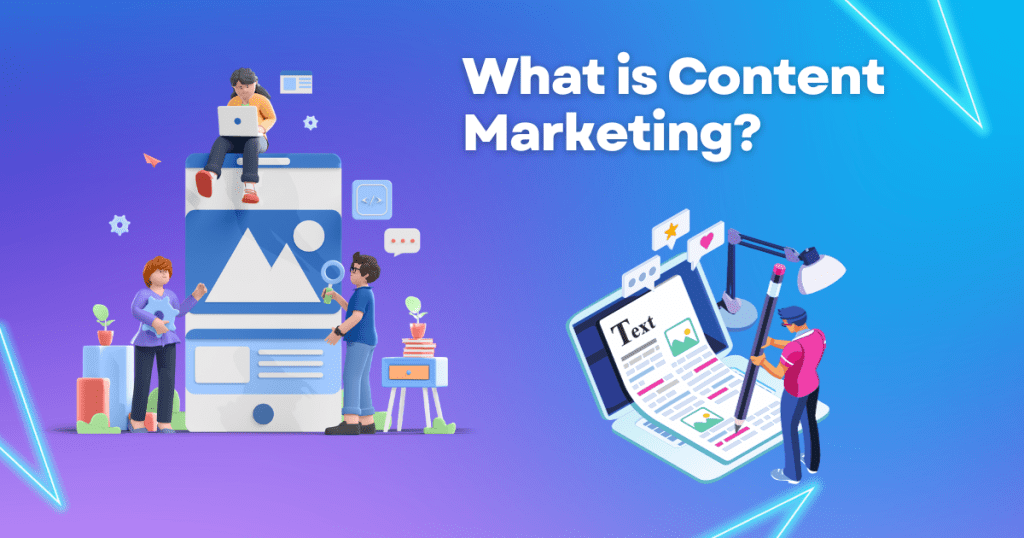
What are Content Marketing Services?
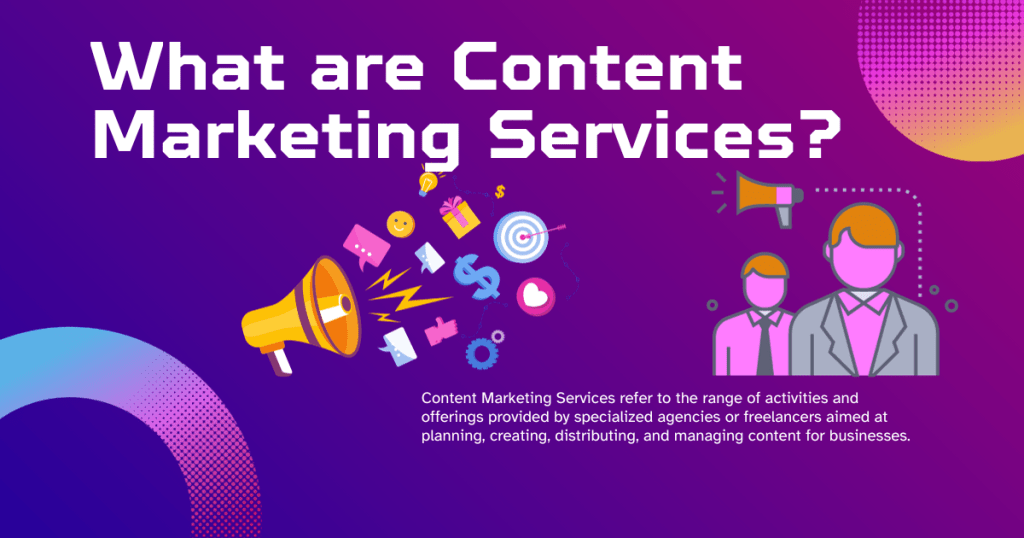
Content marketing services are dynamic strategies that involve creating, distributing, and sharing valuable information to attract and engage a target audience. These services aim to tell compelling stories, spark conversations, and build strong relationships with consumers through the use of high-quality content such as articles, videos, blogs, and social media posts.
Key Aspects:
- Content Creation: This includes crafting high-quality blog posts, articles, infographics, videos, and other forms of media that resonate with the intended audience. The content is often tailored to align with the company’s tone, style, and messaging goals.
- Content Strategy: Here, the focus is on understanding the target audience, determining content goals, and developing a plan to create and distribute content effectively. This often involves keyword research for SEO, content calendar creation, and identifying the right channels for distribution.
- Content Distribution: This involves getting the content in front of the right audience through various channels such as social media, email marketing, SEO, and paid advertising.
- Content Management: This includes organizing and maintaining the content effectively, often through content management systems (CMS), ensuring that it remains relevant and up-to-date.
The Types of Content Marketing Services
Content marketing services can be incredibly diverse, catering to different aspects of a content strategy. Here are some of the most common types:
Blog Writing Services: These services specialize in creating high-quality, SEO-friendly blog posts that are informative, engaging, and tailored to the audience’s interests and queries.
Video Production: With the rising popularity of video content, these services focus on producing compelling video content, which can range from product demonstrations to educational content or brand storytelling.
Infographic Creation: Infographics are powerful for simplifying complex data and presenting it in an easily digestible format. These services specialize in designing visually appealing and informative infographics.
Social Media Content Services: These involve creating and managing content for social media platforms, ensuring that it’s engaging, platform-appropriate, and consistent with the brand’s voice.
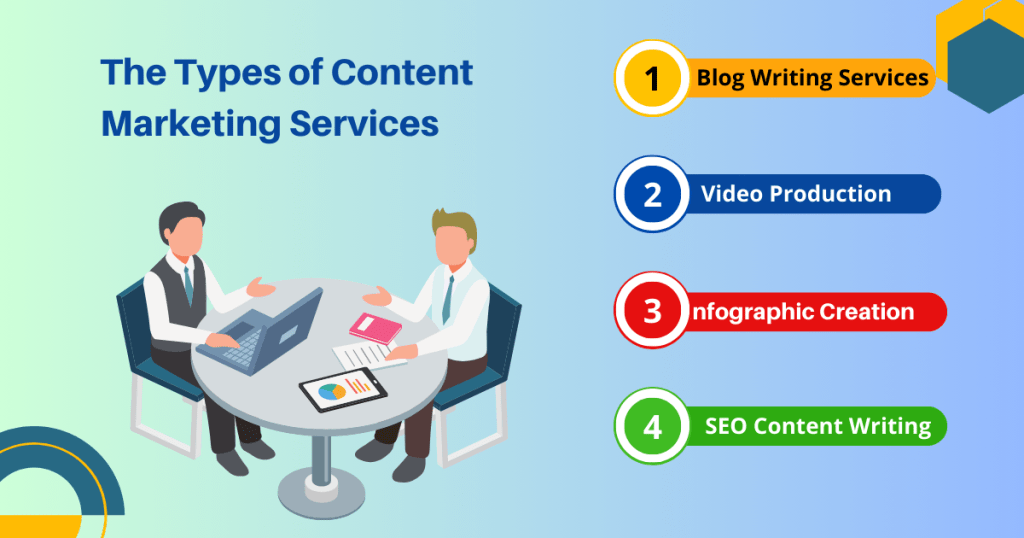
Email Marketing: This includes crafting and sending out email campaigns that inform, engage, and convert subscribers. It often involves newsletter creation, promotional emails, and personalized content.
SEO Content Writing: Focused on creating content that ranks well on search engines, these services involve keyword research, competitor analysis, and writing content optimized for search engines.
Content Auditing: This service includes evaluating existing content to determine its effectiveness and suggesting improvements or new strategies.
E-books and Whitepapers: These are in-depth, authoritative content pieces often used in B2B marketing. They are useful for thought leadership and generating leads.
The significance of variety: The variety in content marketing services allows businesses to choose what best suits their needs and goals. Some may require comprehensive services that cover all aspects, while others might need specific services like blog writing or social media content. Stats to consider: According to HubSpot, 70% of marketers are actively investing in content marketing, and 24% plan on increasing their investment in content marketing services.
Why is Content Marketing Important?
Content marketing is more than just a buzzword; it’s a crucial element in a modern marketing strategy for several compelling reasons:
Builds Trust with Your Audience: Regularly providing valuable content helps establish your brand as an authority in your field. This trust is foundational for building lasting customer relationships.
Improves Brand Awareness: Quality content increases your visibility online. The more valuable the content, the more likely it is to be shared, expanding your reach and recognition.
Supports SEO Efforts: Content is at the heart of SEO. Consistent, high-quality content that answers your audience’s questions helps improve your rankings in search engine results, making it easier for potential customers to find you.
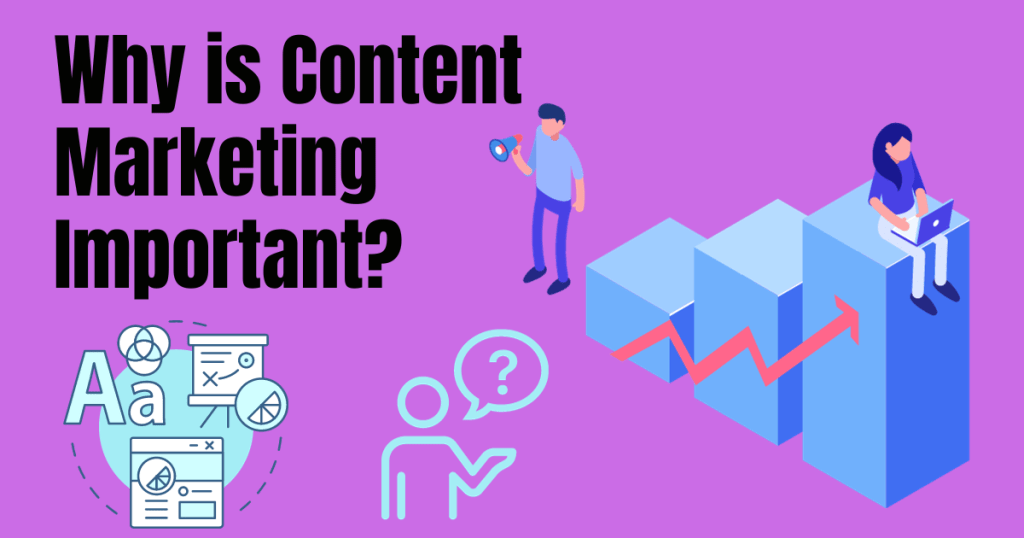
Generates Leads: Effective content marketing attracts and engages leads, providing them with the information they need to make informed purchasing decisions.
Fosters Customer Loyalty: Beyond attracting new customers, good content keeps existing customers engaged with your brand, increasing customer retention and loyalty.
Supports Other Marketing Tactics: Content marketing supports other digital marketing strategies, including social media marketing, email marketing, and PPC campaigns.
According to Demand Metric, content marketing costs 62% less than traditional marketing and generates approximately 3 times as many leads.
Seth Godin, a marketing guru, puts it, “Content marketing is the only marketing left” – reflecting its critical role in the digital age where traditional marketing methods are becoming less effective.
How Does Content Marketing Work?
Content marketing works by creating a strategic framework where every piece of content is designed to attract, engage, and possibly convert a target audience. Here’s a breakdown of how this process typically works:
Identify the Target Audience: Understanding who the content is for is crucial. This involves creating buyer personas, which represent the ideal customers, including their needs, challenges, and behavior patterns.
Set Clear Goals: What does the business want to achieve with its content? This could be increasing brand awareness, generating leads, improving search engine rankings, or establishing thought leadership.
Develop a Content Strategy: This strategy outlines the types of content to be created (blogs, videos, infographics, etc.), the topics to be covered, the publishing schedule, and the channels for distribution.
Create and Distribute Content: The content should be valuable, relevant, and consistent with the brand’s voice. Distribution channels can include the company’s website, social media platforms, email newsletters, and more.
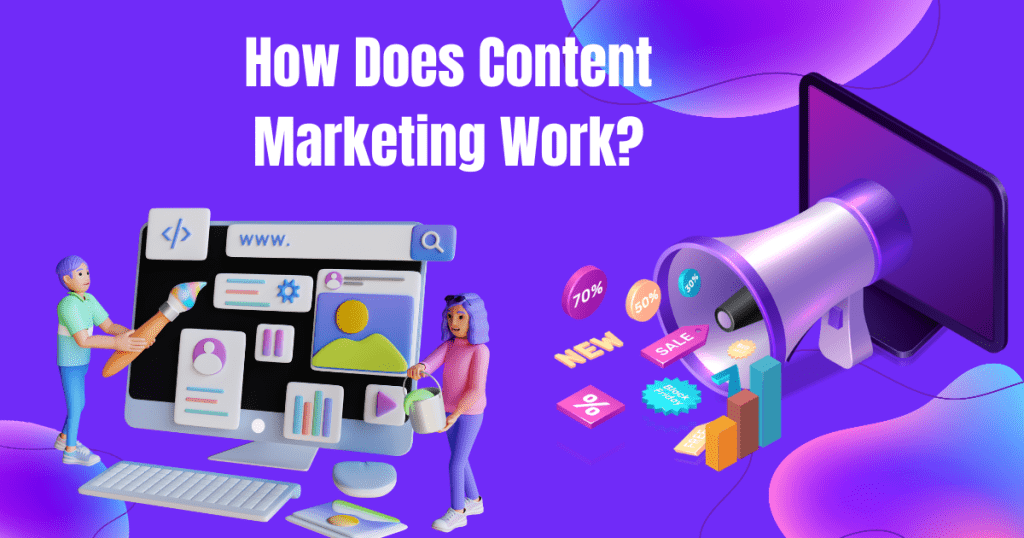
Optimize for SEO: To improve visibility, content should be optimized for search engines, involving keyword research, on-page SEO techniques, and building backlinks.
Measure and Analyze: Using analytics tools, marketers can track the performance of their content, understand what’s working and what’s not, and make informed adjustments to their strategy.
Iterate and Improve: Based on analytics, content strategies should evolve to better meet the needs of the audience and the goals of the business.
HubSpot reports that 70% of marketers are actively investing in content marketing, and 40% say content marketing is a very important part of their overall marketing strategy.
Joe Pulizzi, founder of Content Marketing Institute, says, “Your goal should be about more than just clicks. You want to develop content that makes your audience more informed or entertained, then use that content to build relationships over time.”
Why Use Content Marketing?
Content marketing has become a fundamental aspect of modern marketing strategies for various compelling reasons:
Enhanced Brand Recognition: Consistently delivering valuable content helps establish your brand in the minds of consumers. This recognition is crucial in a crowded market.
Builds Trust and Credibility: High-quality, informative content positions your brand as an authority in your industry, fostering trust with your audience.
Supports SEO Efforts: Content is key to SEO success. By creating relevant and valuable content, you improve your chances of ranking higher in search engine results.
Cost-Effectiveness: Compared to traditional marketing methods, content marketing is more cost-effective and provides a better return on investment over time.
Generates Leads and Boosts Conversions: Quality content can attract potential customers and guide them through the buying process, leading to increased conversions.

Customer Education: Content marketing educates your customers about your products or services, helping them make informed decisions.
Long-Term Results: Unlike traditional advertising, the benefits of content marketing can last for years. Evergreen content continues to attract new leads long after it’s published.
Supports Other Digital Marketing Strategies: It complements other marketing efforts like social media marketing, email marketing, and PPC campaigns.
Increased Customer Engagement: Engaging content creates a platform for interaction with your audience, fostering a community around your brand.
Data Collection and Personalization: Content marketing allows for data collection about customer preferences and behaviors, enabling more personalized marketing efforts.
According to Marketing Insider Group, companies that blog consistently receive 67% more leads than those that don’t. David Beebe, one of the pioneers of brand storytelling in the digital age, says, “Content marketing is like a first date. If all you do is talk about yourself, there won’t be a second date.”
How to Get Started with Content Marketing
Getting started with content marketing can seem daunting, but breaking it down into manageable steps can make the process smoother and more effective. Here’s a guide to kick-start your content marketing journey:
Define Your Goals: What do you want to achieve with your content marketing efforts? It could be increasing brand awareness, generating leads, boosting sales, improving customer engagement, or establishing thought leadership.
Understand Your Audience: Create detailed buyer personas to understand your audience’s needs, preferences, and pain points. This will guide your content creation towards topics that resonate with them.
Audit Your Current Content: If you already have content, conduct an audit to see what’s working and what isn’t. This can give you insights into the topics and formats that are most effective for your audience.
Develop a Content Strategy: Plan the types of content you will create, how often you will publish, and where you will distribute your content. Your strategy should align with your goals and audience preferences.
Create a Content Calendar: A content calendar helps you organize and schedule your content efficiently. It should include topics, formats, publication dates, and distribution channels.

Start Creating Content: Focus on creating high-quality, engaging, and informative content. Use storytelling, incorporate visuals, and make sure your content is easy to read and understand.
Optimize for SEO: Ensure your content is optimized for search engines to improve visibility. Include relevant keywords, meta descriptions, and optimize images and videos.
Promote Your Content: Distribute your content through various channels like your website, social media, email newsletters, and industry forums. Consider using paid promotion to extend your reach.
Measure and Adjust: Use analytics tools to track the performance of your content. Look at metrics like traffic, engagement, and conversion rates to understand what’s working and make necessary adjustments.
Stay Updated and Evolve: Content marketing is dynamic. Stay informed about the latest trends and best practices, and be ready to adapt your strategy as needed.
Content marketing gets three times more leads than paid search advertising, as reported by the Content Marketing Institute. Neil Patel, a prominent digital marketing expert, says, “Create content that teaches. You can’t give up. You need to be consistently awesome.”
How to Price Content Marketing Services?
Pricing content marketing services can be challenging due to the variety of tasks and the level of expertise required. However, understanding the pricing models can help businesses budget effectively and service providers set fair rates.
Common Pricing Models
Per-Project Basis: This is common for specific, one-time tasks like creating a website, producing a video, or designing an infographic. Prices are quoted based on the project’s scope, complexity, and the time required.
Hourly Rates: Some content marketers charge an hourly rate, especially for consulting, strategy development, and other less tangible services. This rate varies widely based on experience and expertise.
Retainer Model: For ongoing work, such as managing a blog or social media accounts, a monthly retainer fee is common. This provides a predictable cost for businesses and steady income for service providers.
Performance-Based Pricing: In some cases, especially with SEO and digital marketing services, pricing might be tied to performance metrics like traffic growth or lead generation.

Factors Influencing Price
- Quality and Expertise: Highly experienced content marketers or those with specialized skills often charge more due to the value they bring.
- Content Complexity: Technical topics or niches requiring extensive research can lead to higher prices.
- Market Rates: Prices also depend on industry standards and what competitors are charging.
According to a survey by the Content Marketing Institute, 65% of the most successful content marketers have a documented content marketing strategy, indicating that strategic planning, a part of content marketing services, is highly valued.
It’s essential to balance fair pricing with the value provided. Overcharging can drive clients away, but underpricing can undervalue the service. Clear communication about what is included in the price and the expected outcomes can help set realistic expectations.
Content Marketing Strategy
A content marketing strategy is a plan for building an audience by publishing, maintaining, and spreading frequent and consistent content that educates, entertains, or inspires to turn strangers into fans and fans into customers. Here’s how to develop a robust content marketing strategy:
Set Clear Objectives: Define what you want to achieve with your content marketing efforts. This could be anything from increasing brand awareness to driving sales.
Understand Your Audience: Conduct research to understand your target audience’s interests, needs, and pain points. Create buyer personas to tailor your content effectively.
Choose the Right Channels: Determine where your audience spends their time online and focus your content distribution on these platforms, whether it’s your blog, YouTube, LinkedIn, or elsewhere.
Decide on Content Types: Based on your audience’s preferences and your business goals, decide on the types of content you will produce, such as blog posts, videos, infographics, or podcasts.
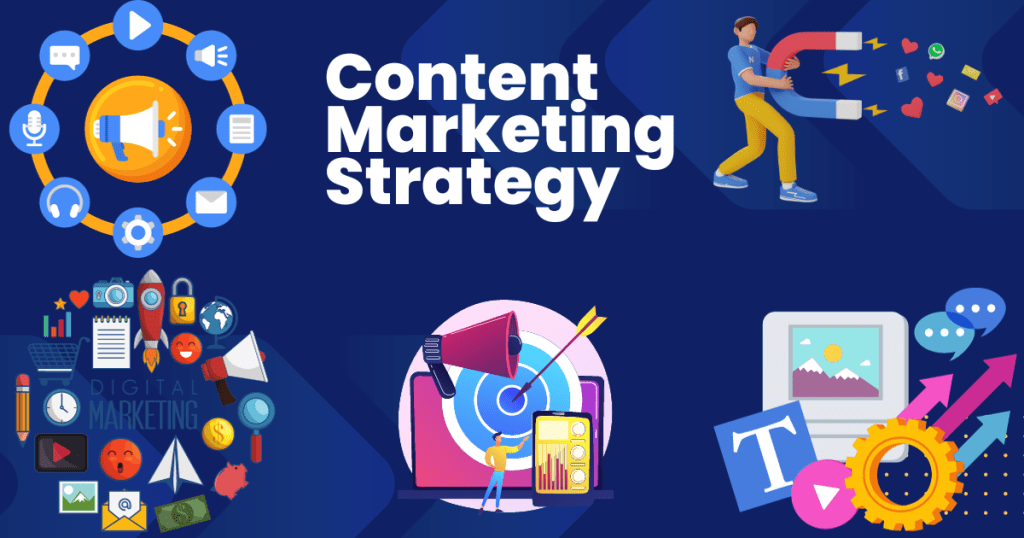
Create a Content Calendar: Plan your content in advance with a content calendar. Schedule when and where you’ll publish your content to maintain consistency.
Focus on Quality and Value: Ensure your content is high-quality, informative, and provides value to your audience. Quality content is more likely to engage and convert readers.
Optimize for SEO: To increase your content’s reach and visibility, optimize it for search engines using keywords, meta tags, and high-quality backlinks.
Promote Your Content: Share your content across your chosen channels, and don’t hesitate to repurpose it to fit different platforms.
Measure Your Results: Use analytics to track the performance of your content. Look at metrics like engagement, traffic, and conversion rates to gauge success and identify areas for improvement.
Iterate and Evolve: Continuously refine your strategy based on feedback and performance metrics. Be adaptable to changes in audience preferences and market trends.
According to the Content Marketing Institute, 72% of content marketers who increased their level of success over the past year attributed it to the development or adjustment of their content strategy.
Joe Pulizzi, founder of the Content Marketing Institute, emphasizes, “It’s not about ‘what you sell’; it’s about ‘what you stand for.’” This highlights the importance of a strategy that aligns with your brand values and addresses your audience’s interests.
Content Marketing and SEO
Content marketing and SEO are intricately linked, working together to boost your online presence and drive traffic to your site. Here’s how they complement each other:
Quality Content Drives SEO: Search engines favor high-quality, relevant content. By producing valuable content, you’re more likely to rank higher in search results.
Keywords Integration: Effective content marketing involves incorporating keywords naturally into your content. This helps search engines understand and rank your content for those terms.
Regular Updates Boost Rankings: Search engines favor websites that are regularly updated with fresh content. A consistent content marketing strategy ensures your site stays active and relevant.
Backlinks from Quality Content: High-quality content encourages other websites to link to your content. These backlinks are crucial for SEO, as they signal to search engines that others find your content valuable.

Improved User Engagement: Engaging content keeps visitors on your site longer, reducing bounce rates. This positive user engagement signals to search engines that your site is providing valuable content.
Content Variety and Rich Snippets: Diverse content types, like videos, images, and infographics, can lead to rich snippets in search results, making your listings more noticeable.
Local SEO through Content: For businesses targeting local markets, localized content can improve visibility in local search results.
According to ImpactBND, websites with blog content have 434% more indexed pages for search engines, significantly improving SEO performance. Rand Fishkin, a well-known figure in the SEO world, suggests, “Invest in content that earns attention and respect. It’s the kind of investment in SEO that will pay dividends for years.”
Examples of Content Marketing Services
To give a clearer idea of what content marketing services can offer, here are some examples:
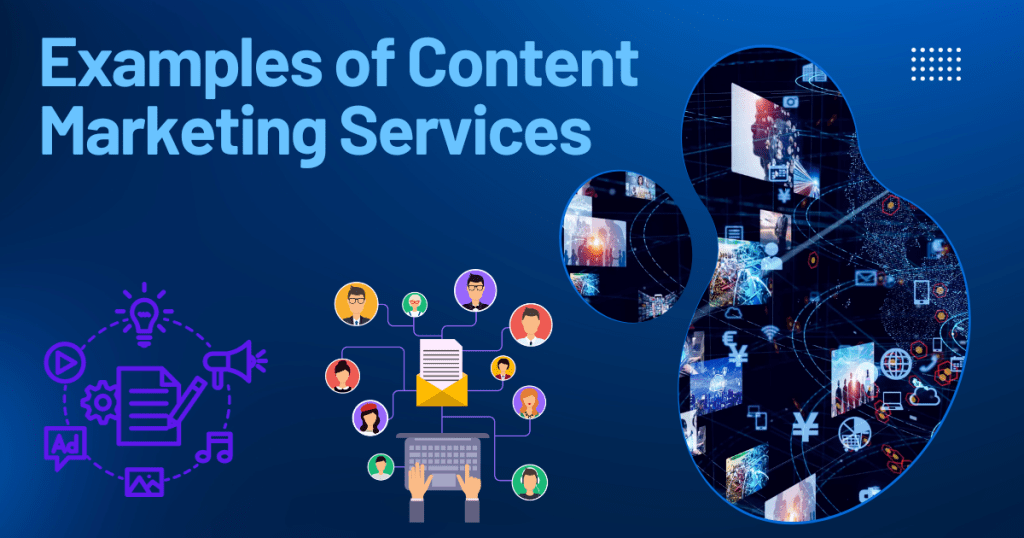
HubSpot: Known for its comprehensive inbound marketing services, HubSpot offers a range of content marketing tools and services. They specialize in blog content creation, SEO, social media marketing, and marketing automation.
Contently: Contently pairs businesses with a network of writers and content creators and provides tools for content strategy, creation, and analytics. They’re known for their high-quality content and effective content strategy development.
Copyblogger: This service focuses on content writing and is renowned for its educational resources on content marketing. They offer tools and services for creating compelling written content, with a strong emphasis on SEO.
BuzzSumo: While primarily a tool for content research and analytics, BuzzSumo also helps in identifying trending topics and content types, making it invaluable for content strategy and creation.
CoSchedule: CoSchedule offers content marketing services focused on planning and automating content. Their editorial calendar tool is widely used for organizing and scheduling content across various platforms.
Scripted: This platform connects businesses with freelance writers, offering services from blog posts to white papers. Scripted is known for its high-quality writing and quick turnaround times.
Animoto: Specializing in video content, Animoto provides tools and services for creating professional-quality videos. Their platform is user-friendly and particularly popular with businesses for creating marketing and social media videos.
Ann Handley, a well-respected figure in digital marketing, says, “Even when you are marketing to your entire audience or customer base, you are still simply speaking to a single human at any given time.” This reflects the personalized approach that these services often adopt in their content creation.
Why is includework Best for Content Marketing Services?
Includework has emerged as a significant player in the field of content marketing services. Its tailored approach and comprehensive offerings make it a top choice for businesses seeking to enhance their content marketing strategies. Here’s why includework stands out in the realm of content marketing services.
Customized Content Solutions
- Tailored Strategies: Includework excels in creating customized content strategies that align with each client’s unique business goals and target audience.
- Versatility: Whether it’s blog posts, social media content, video production, or email campaigns, includework offers a wide range of content solutions to meet diverse needs.
Expert Team with Diverse Skills
- Skilled Professionals: Includework boasts a team of experts with a broad skill set, including content creation, SEO, social media management, and analytics.
- Industry Insights: Their professionals bring insights from various industries, enabling them to craft content that resonates with specific market segments.

Data-Driven Approach
- Analytics and Measurement: Includework uses advanced analytics tools to measure content performance, providing clients with actionable insights and data-driven recommendations.
- Continuous Optimization: They focus on continuous optimization of content strategies based on performance data, ensuring maximum effectiveness and ROI.
SEO and Digital Marketing Expertise
- SEO Integration: Their services include a strong focus on SEO, ensuring that content is not only high-quality but also optimized for search engines to increase visibility and organic traffic.
- Holistic Marketing Approach: Includework integrates content marketing with overall digital marketing strategies, enhancing the impact across all online channels.
Client-Centric Approach
- Understanding Client Needs: Includework prioritizes understanding their clients’ business objectives, target audience, and market dynamics.
- Personalized Service: They provide personalized service, ensuring that each client receives attention and solutions that are specifically tailored to their needs.
Scalability and Flexibility
- Adaptability: Includework is adaptable to changing market trends and client requirements, offering scalable solutions that grow with the client’s business.
- Flexibility in Service Offering: They offer flexible service packages that can be customized according to the size, budget, and specific requirements of the client.
How Does includework Work?
Includework has established itself as a prominent content marketing service provider, known for its effectiveness and client-centric approach. Understanding how includework operates can provide insights into why it is a preferred choice for many businesses. Let’s break down the operational process of includework in content marketing.
Initial Consultation and Strategy Development
- Client Meeting: The process typically begins with an initial consultation, where includework’s team meets with the client to understand their business objectives, target audience, and specific needs.
- Strategy Formulation: Based on the initial discussion, includework develops a comprehensive content marketing strategy tailored to the client’s goals and market dynamics.
Content Creation and Management
- Diverse Content Production: The team at includework creates a variety of content types, from blog posts and articles to videos and social media content, all aligned with the agreed strategy.
- Content Scheduling and Management: They manage the entire content lifecycle, including scheduling, publishing, and managing content across various platforms.
SEO and Online Visibility
- SEO Optimization: Each piece of content is optimized for search engines, incorporating relevant keywords, meta tags, and other SEO best practices.
- Enhancing Online Presence: The focus is on not just creating quality content but also ensuring it enhances the client’s online visibility and reach.

Analytics and Performance Tracking
- Data Analysis: Includework employs advanced analytics tools to track the performance of the content, analyzing metrics like engagement rates, traffic, and conversion.
- Performance Reports: Clients receive regular reports detailing the performance of their content, offering transparency and insights into the effectiveness of the strategy.
Continuous Optimization and Adaptation
- Adaptive Strategy: Based on the analytics and client feedback, includework continuously adapts and optimizes the content strategy to ensure ongoing effectiveness and alignment with evolving market trends.
- Responsive to Client Needs: The team remains responsive to any changes in the client’s requirements or shifts in the market, ensuring the content strategy remains relevant and impactful.
Client Support and Communication
- Regular Communication: Includework maintains regular communication with clients, providing updates and responding to any queries or feedback.
- Client Support: They offer ongoing support, ensuring that the client is involved and informed throughout the content marketing process.
Conclusion
In conclusion, our exploration into content marketing reveals its pivotal role as a cornerstone of modern business strategy. Through diverse content formats such as articles, social media posts, videos, and comprehensive plans, businesses effectively connect with audiences, foster brand loyalty, and drive growth. Key takeaways underscore the importance of an audience-centric approach, diverse content offerings, maintaining quality and consistency, integrating SEO, and adapting through analytics.
Professional services like includework offer expertise in strategy development, content creation, and performance tracking. Looking ahead, content marketing will evolve with new technologies like AI and augmented reality, focusing on personalized and immersive experiences. Ultimately, content marketing services provide a crucial pathway for businesses to engage and succeed in the digital realm, leveraging expertise and audience understanding for significant growth.






